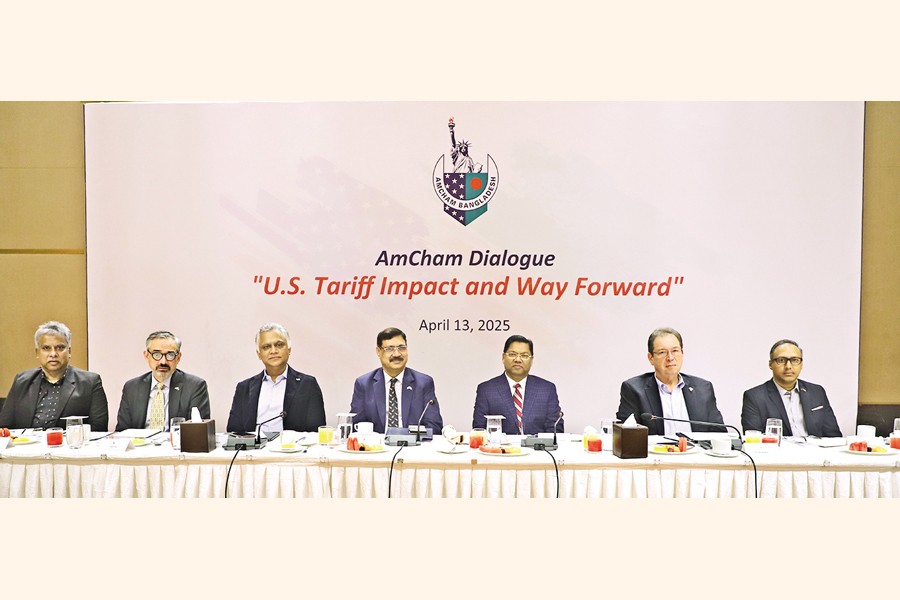
Published :
Updated :

Bangladesh must take urgent and proactive measures strategically leveraging the 90-day US tariff respite otherwise it might be at risk of losing large volume of seasonal work orders for next holidays.
The county also has to inform the US about the measures it is going to take addressing the concerns related to reduce high import tariffs, how to increase import especially US cotton and strengthening the supply chain by setting up bonded warehouse, protection of intellectual property.
The remarks and suggestions came at a dialogue titled 'US Tariffs-Impact and Way Forward' organised by AmCham (American Chamber of Commerce in Bangladesh) to share the concerns and suggestions regarding the recently imposed US tariffs.
Businesses and exporters also suggested including the private sector in the negotiations process.
Speaking at the dialogue, Syed Nasim Manzur, president, Leathergoods and Footwear Manufacturers & Exporters Association of Bangladesh (LFMEAB), expressed concern over the new US tariffs regime.
"We should not become complacent of 90 days tariff pause. Bangladesh has to inform the US fast what it is going to do."
Along with apparel there are other goods export to the US including footwear and ceramics, he said most of Bangladesh's exportable products are seasonal based on fashion cycle.
When the 90 days tariffs hold come to an end, the season for Christmas holidays work orders-the biggest one-- would start, he said, explaining that if there is no clarity of products price during that time, work orders for Christmas and holidays would not be fixed.
"We will miss the season and loose the cycle. We can't sleep for a day," he, also managing director of Apex Footwear Limited, said warning that they would not survive without the holiday season work orders.
Some of the small and medium-sized factories have already shipments in ports on hold and if the proceeds do not come in, their ability to manage cash flow, wage payment to workers would be disrupted that might create fresh labour unrest in the industrial zones like Ashulia and Gazipur, he noted. While diversification is important he said it's not enough.
He noted the NBR is reviewing tariffs on 20 low-revenue items (Around $100 million) and addressing non-tariff barriers.
Despite challenges, he sees strong potential, with a key USTR meeting set for April 21.
He highlighted non-tariff barriers, including the need for 24/7 customs operations and stronger IPR enforcement.
With the updated Patent Act, he stressed presenting this progress at the upcoming USTR meeting.
A plan is needed to offset a possible 37 per cent tariff, as competitors are already preparing, he said, proposing a weekly progress tracker, led by senior government and supported by the private sector, to monitor key importable and seize this short-term opportunity.
He also stressed that Bangladesh must look "beyond customs duties." While most US importable already enjoy near-zero duties, the reliance on supplementary duties is unsustainable and should be phased out through a clear short- and long-term plan.
US is not only important for single largest export destination but also for its growth as 67 of its economy driven by consumption, he said, adding Bangladesh cannot afford losing the US market.
John Fay, Commercial Counselor, US Embassy Dhaka, said US companies face not only high import duty but the supplementary duties in many cases are also very high especially for IT and cold chain.
Terming 90 days not enough time, he stressed for specific measures engaging the private sector too.
Highlighting the US as Bangladesh's top export market and key investor, AmCham President Syed Ershad Ahmed said the country is contributing capital, technology transfer, and expertise in sectors like insurance, hospitality, and technology.
He acknowledged over 50 years of US-Bangladesh ties and called for reciprocal tariff adjustments and a bilateral agreement to address trade barriers.
Mohammad Belal Hossain Chowdhury, Member (VAT Implementation & IT), NBR, announced that draft legislation for the Central Bonded Warehouse is in progress, aiming to resolve longstanding issues with a solution-focused approach.
munni_fe@yahoo.com


 For all latest news, follow The Financial Express Google News channel.
For all latest news, follow The Financial Express Google News channel.